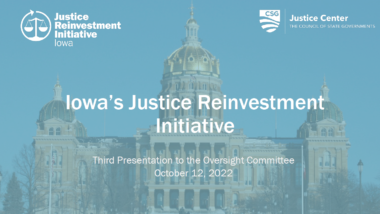
Iowa Oversight Committee on Justice Reinvestment Reviews Final Results of Assessment of Pandemic-Related Changes
On October 12, 2022, the Iowa Oversight Committee on Justice Reinvestment met for the third and final time to review the results and data-driven recommendations from a comprehensive supervision assessment. This assessment—conducted by The Council of State Governments (CSG) Justice Center—included extensive analyses of community supervision practices, public safety impacts, and racial disproportionalities within the state’s community-based corrections (CBC) system.
CSG Justice Center staff members have been working with Iowa state leaders and stakeholders to answer the following questions:
- Did changes that were implemented in March 2020 have a positive, negative, or neutral impact on public safety and CBC operations?
- Should Iowa continue and/or enhance these new procedures to increase officers’ ability to successfully supervise individuals in the community?
- Do the Iowa Department of Corrections and CBC need any specific resources to successfully supervise individuals in the community?
- What data-driven recommendations can maximize potential benefits and resources to improve success for clients in the community?
Key findings from the public safety and racial disproportionality analyses include the following:
- Case-level data do not indicate a statistically significant shift in violent crime after March 2020 among clients on community supervision. This finding holds across all measures of violent crime used in the analysis. There was some variation by judicial district, but few districts experienced statistically significant changes.
- There is substantial racial disproportionality in the CBC client population compared to the general population in the state as a whole—particularly with Black and American Indian clients as compared to White clients. Across parole, probation, and work release, Black clients are 5.1 times more likely to be on supervision than White clients, while American Indian clients are 3 times more likely to be on supervision than White clients.
- Black people on community supervision are 9 percent more likely to be revoked and 31 percent less likely to be referred to external interventions when compared to White clients with similar criminal histories and demographics.
Key findings from the assessment of Iowa’s CBC system include the following:
- CBC agencies adapted quickly to the public health crisis and implemented several practice changes, including participating in virtual court and revocation hearings, convening virtual treatment groups, implementing virtual client contacts, and expanding the practice of reviewing recommendations for supervision revocations to limit the number of people returning to prisons and jails.
- CBC staff identified challenges with these changes, including that some feel they no longer have the discretion to recommend revocation when they view it as an appropriate response to client behavior.
- CBC staff also reported positive outcomes of these changes, including higher client participation and completion rates in programs, increased access to job opportunities and training for clients, and increased flexibility for staff as a result of new remote work options.
- Revocations after March 2020 were linked to approximately 25 percent more public safety threat violations indicating that the use of revocations has focused more on addressing public safety concerns.
- Criminal justice stakeholders across the state consistently identified a lack of community-based behavioral health treatment providers to meet the needs of the population.
More information about the analyses, results, and recommendations can be found here. This work is part of Iowa’s Justice Reinvestment Initiative (JRI) effort, which officially launched in February 2022. JRI is funded by the U.S. Department of Justice’s Office of Justice Programs, Bureau of Justice Assistance and The Pew Charitable Trusts.
This project was supported by Grant No. 2019-ZB-BX-K002 awarded by the Bureau of Justice Assistance. The Bureau of Justice Assistance is a component of the Department of Justice’s Office of Justice Programs, which also includes the Bureau of Justice Statistics, the National Institute of Justice, the Office of Juvenile Justice and Delinquency Prevention, the Office for Victims of Crime, and the SMART Office. Points of view or opinions in this document are those of the author and do not necessarily represent the official position or policies of the U.S. Department of Justice.
About the authors


Arkansas policymakers have long expressed concerns about the state’s high recidivism rate. Over the past 10 years, an…
Read MoreIn April 2025, Arkansas Governor Sarah Huckabee Sanders signed a package of bipartisan criminal justice legislation into law,…
Read More Explainer: Key Findings and Options from Arkansas’s Justice Reinvestment Initiative
Explainer: Key Findings and Options from Arkansas’s Justice Reinvestment Initiative
Arkansas policymakers have long expressed concerns about the state’s high recidivism rate.…
Read More Explainer: How a New Law in Arkansas Tackles Crime, Recidivism, and Community Supervision Challenges
Explainer: How a New Law in Arkansas Tackles Crime, Recidivism, and Community Supervision Challenges
In April 2025, Arkansas Governor Sarah Huckabee Sanders signed a package of…
Read More










